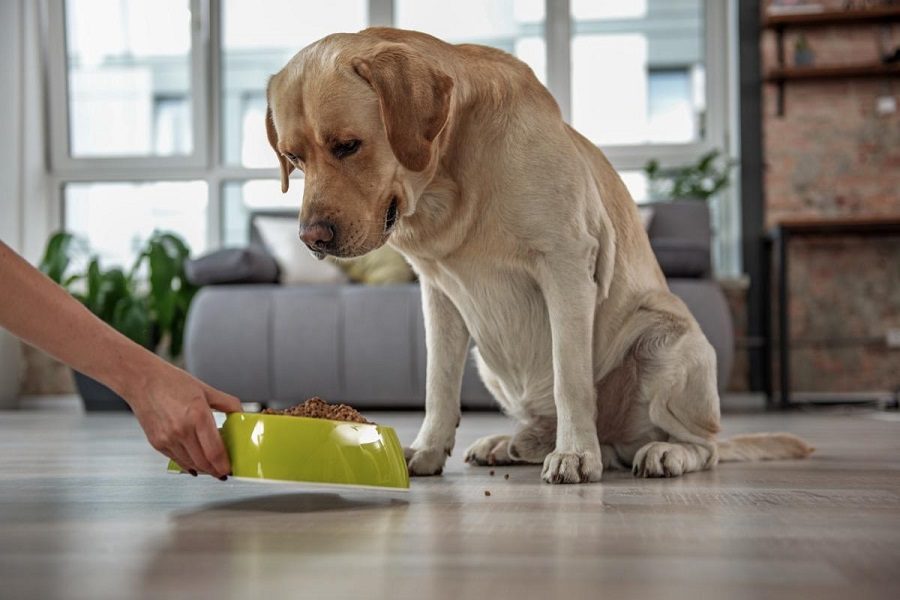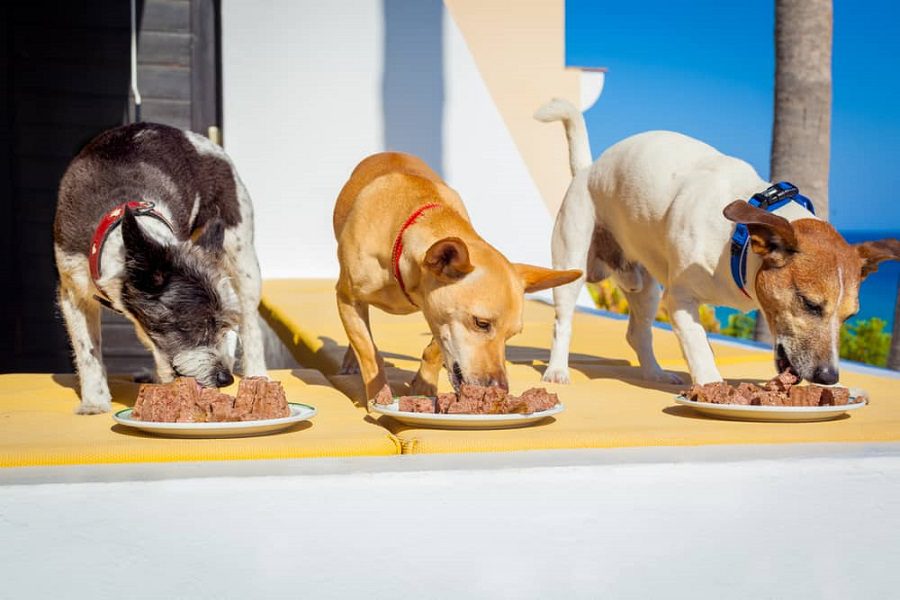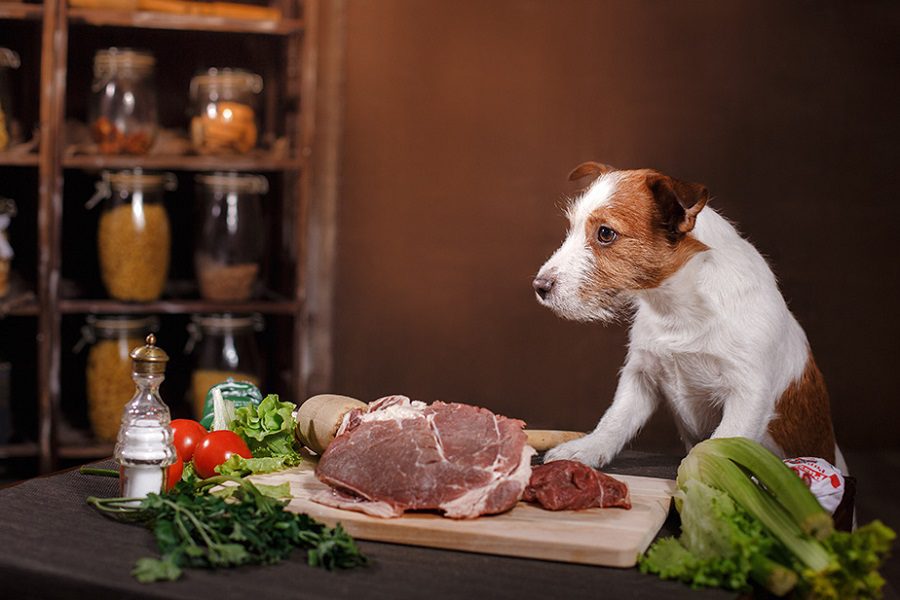Last Updated: 1 year ago
Dogs are curious creatures that will try to eat practically anything.
That opens opportunities for you to share some of your favorite foods with your best friend. It’s important, however, to know what’s healthy and unhealthy for dogs to eat.
There are some foods dogs can eat and some that you should simply never let your dog try, no matter how much she begs you.
There are others, however, that can make an interesting part of her diet. Use this list to help you decide whether it’s a good idea to indulge Fido the next time she starts begging for a snack.
Fruits
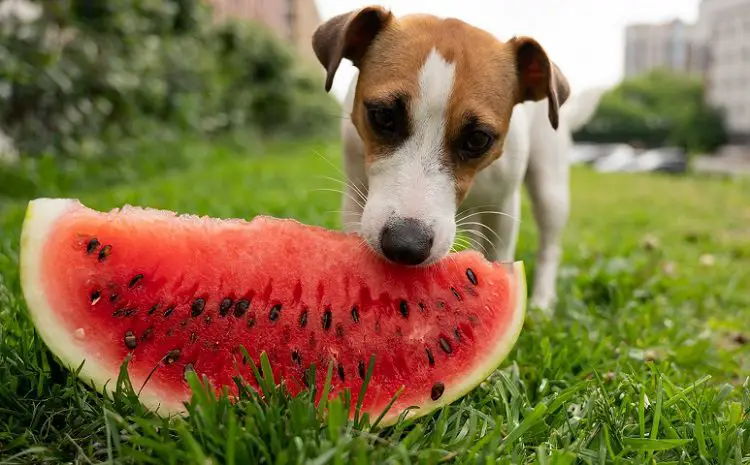
Can Dogs Eat Apples?
An apple probably doesn’t seem like the kind of thing that your dog would want. After all, it isn’t made of meat and it doesn’t smell disgusting. Those are usually the two qualities that dogs look for most when hunting for treats, right?
What’s somewhat surprising is that a lot of dogs really like the taste of apples. Hold out a partially eaten apple and they will use their front teeth to snip off the fleshy bits.
Perhaps even more surprising is that apples are good for your dog’s physical and dental health. They contain a lot of vitamin A and vitamin C that your dog needs for a long, happy life. Since they’re a bit difficult to chew, they can also help clean your dog’s teeth.
What’s most import, at least from your perspective, is that an apple can improve your dog’s breath. If you have a stinky pooch, then an apple slice could help get rid of the odor, at least until she finds something stinky to chew on.
There are a couple of things to think about before giving your dog apples.
- The seeds contain a small amount of amygalin, which is poisonous to dogs. Make sure you remove the seeds before handing your dog an apple.
- Provide close supervision. Since apples are a little hard to chew, your dog may choke on them.
- Cut them into small pieces so you can help your dog enjoy without getting choked. Don’t cut them too small, though, or you could lessen the positive effects apples have on the teeth and gums.
Can Dogs Eat Bananas?
Bananas are one of those foods that you should only give your dog sparingly. The fruit has plenty of vitamin C and vitamin B6, so it’s a good idea to let your dog have a bite every now and then. Bananas can also serve as a good source of:
- Fiber
- Potassium
- Biotin
- Manganese
- All of these are important to maintaining a healthy diet for dogs.
There is a small problem with bananas, though. They contain a lot of sugar. That means you should only give them to your pet as a treat. Don’t make it a part of his or her daily meals. Instead, use bananas as a reward.
You should also make sure that your dog chews up the banana well before swallowing. A large chunk of banana can block the digestive tract and cause constipation. If your dog simply refuses to chew up his or her treat, then you can mash it.
Can Dogs Eat Grapes?
Put grapes on the list of foods that you should never give your dog. Grapes contain a substance that is toxic to dogs. Even a small number of grapes could cause health problems or even death. Vets don’t know the precise chemical that causes toxicity, but the phenomenon is well documented.
Raisins are also potentially poisonous, so keep your dog away from them.
If your dog ingests grapes or raisins, then you may notice some of these health problems:
- Vomiting and diarrhea
- Lethargy
- Inability to pass urine
- Only passing small amounts of urine
- Signs of stomach pain
- Signs of dehydration, such as unexplained panting
Dogs who die after they eat grapes usually experience kidney failure. This might help explain why even eating a small amount can make it difficult for dogs to urinate.
If you suspect that your dog has eaten grapes, then you should seek emergency treatment immediately. You can try to induce vomiting with a solution of water and hydrogen peroxide, but it is always best to see an emergency vet.
Also, do not try to induce vomiting if your dog is unconscious or having trouble breathing.
Can Dogs Eat Watermelon?
Watermelon makes a great treat on a summer day. Luckily, your pet can join you in this tasty treat.
Watermelons, as the name suggestions, are primarily made of water. Other than H2O, it’s mostly fiber and fruit sugar. Most dogs can tolerate these without any problems.
You should, however, follow some precautions.
Since watermelon seeds can block the intestines, remove them before giving watermelon to your dog. That’s especially important if you have a small dog.
You should also make sure you take the watermelon away before your dog starts to chew on the rind. The rind’s bitter taste is caused by a harsh chemical that can upset your dog’s stomach. That may lead to some potty issues that you really do not want to encounter.
To play it safe, always remove the seeds and ring before your dog enjoys a piece of watermelon.
Can Dogs Eat Strawberries?
Fresh strawberries make a great treat for your dog. Strawberries are high in antioxidants that can help your pet live a longer life by lowering risks associated with old age. The antioxidants in strawberries may even help prevent diseases like cancer.
There is one important caveat to feeding your dog strawberries. Never make the mistake of giving them strawberries that have been packaged in syrup. The syrup contains massive amounts of sugar that are not good for your dog’s health.
You can also improve your dog’s enjoyment by cutting the strawberries into small bites. This will make it easier for your pup to chew and digest. If you have a very small dog, then you may want to use a fork to mash up the strawberries.
There is always the possibility that your dog could have an allergy to strawberries. If you notice anything off, then stop giving your dog the berries and opt for other healthy treats.
Can Dogs Eat Blueberries?
Like strawberries and many other fruits, blueberries are high in antioxidants that can improve your dog’s health and extend his or her life. Many dog food manufacturers, in fact, include blueberries in their products to make them healthier.
There are several ways that you may want to give blueberries to your dog. Fresh, washed blueberries make a great snack. For a crunchy treat, put them in the freezer overnight. Many dogs enjoy chewing cold blueberries on hot days.
Although blueberries are potentially healthy for your dog, you should only give your dog moderate amounts. The exact number of berries should depend on the dog’s size.
If you have a medium-sized dog, then ten or so blueberries is an appropriate amount. Smaller dogs may need fewer. Larger dogs can usually enjoy a few more.
By sticking to a moderate amount, you help minimize the possibility that your dog may get an upset stomach from blueberries. The potential for an upset stomach doesn’t indicate that the blueberries are harmful to your dog.
Introducing any new food to your pup’s diet can create a similar response. If your dog has a bad reaction, then blueberries just aren’t the right treat. Still, they shouldn’t cause any real harm other than maybe needing to go outside a few extra times that day.
Can Dogs Eat Pineapple?
Like most citrus fruits, pineapple is quite good for your dog’s health. That’s because it has a lot of vitamins and nutrients that your dog needs to live a long, healthy life. Some of the nutrition that your dog gets from pineapple includes:
- Vitamin C
- Vitamin B6
- Vitamin BN1
- Folate
- Copper
- Manganese
You’ll find similar nutrients in oranges and other citrus fruits.
You might wonder whether the sweetness of pineapple means that it has too much sugar for your dog to eat. It’s important to distinguish between natural fruit sugars and the type of sugar that you put into desserts. Natural fruit sugar is actually a part of a healthy diet for humans and dogs.
Just because pineapple is a healthy fruit, it doesn’t mean you should let your dog eat very much of it. A couple small chunks are really all your dog should have on a given day.
If you give your dog more than that, then he or she could get an upset stomach. This doesn’t mean that pineapple is bad for your pup. It just means that your dog has eaten too much of something that isn’t a typical part of his or her diet.
When choosing pineapple for your dog, make sure you only choose fresh options. You don’t want to give your pup anything that has been packed in syrup. Canned pineapples, for instance, contains a lot of sugar that your dog should not eat.
A little bit isn’t going to hurt your pooch, but eating that much sugar regularly could contribute to some serious health problems, including diabetes.
Can Dogs Eat Avocado?
You may have heard that avocados are dangerous for dogs to eat. This is partially true. In reality, though, it’s usually fine for your dog to eat avocados if he or she likes them.
The concern about avocados comes from a chemical called persin. Persin is toxic to many animals, including dogs. The good news is that you won’t’ find persin in the avocado meat.
You’ll only find it in the seed, bark, and leaves. As long as your dog isn’t chewing on anything other than the fleshy part, he or she can continue enjoying avocados.
Also, the avocado seed (the large pit in the middle of the fruit) contains a poison. It is important for you to remove the seed before giving it to your dog.
Keep in mind, avocados contain plenty of nutrients that can contribute to your dog’s healthy diet. Some of the healthy things that you will find in avocados include:
- Potassium (In fact, avocados have more potassium than bananas.)
- Fiber
- Healthy Fats
If your dog enjoys the taste of avocados, you shouldn’t feel guilty about giving them as a small snack. Just make sure that you use caution and common sense.
You don’t want your dog to consume the seed. If your dog does, then he or she could get sick. It probably won’t threaten your dog’s life, but it could make him or she feel very bad.
Can Dogs Eat Oranges?
Oranges are a great source of vitamin C that will help your dog stay healthy for years. They also contain plenty of fiber.
Some people may worry that oranges have too much sugar. Keep in mind that there is a difference between fruit sugar and granulated sugar. Fruit sugar eaten in combination with fiber is actually quite healthy for both dogs and humans.
When deciding what portion to give your dog, focus on your dog’s size. A small dog usually only needs one or two slices. A large dog may eat a whole orange.
Although oranges are healthy snacks for dogs, there is a potential problem with their texture. Some dogs find it difficult to check oranges because they are so fibrous.
If your dog seems to have difficulty chewing, then this probably isn’t the best treat for him or her. You don’t want your dog to swallow large portions that could block the intestine.
For the most part, however, oranges are a healthy way to reward your pooch and add some variety to his or her diet. Many of them savor the sweetness of oranges, so they’ll love eating them.
Vegetables
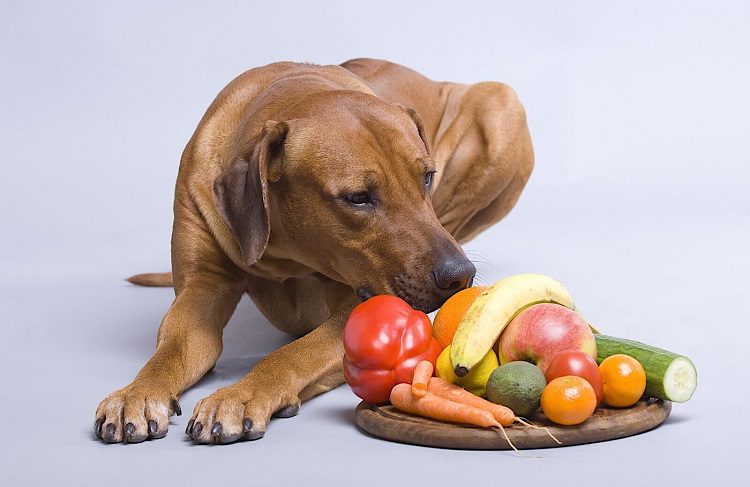
Can Dogs Eat Broccoli?
The idea of a dog munching on broccoli may seem strange to you, but the fact of the matter is that many dogs enjoy the flavor and texture of this popular vegetable. In fact, some companies make wet dog food that is flavored with broccoli.
Of course, your dog probably likes a lot of things that shouldn’t be eaten. Loving the taste of broccoli doesn’t mean that you should let your dog eat it. This raises the important question, can dogs eat broccoli safely?
The easy answer is that they can eat broccoli. The caveat is that you should only give it to your dog occasionally. Broccoli isn’t something that should be an everyday part of your dog’s diet.
Considering the nutritional value of broccoli, it isn’t surprising that dogs can eat it. Raw broccoli contains large amounts of:
- Iron
- Calcium
- Vitamin A
- Vitamin E
- Riboflavin
- Magnesium
These are nutrients that your dog should consume daily.
Vets, however, don’t think that dogs can digest broccoli the way that humans do. This may suggest that your pup doesn’t get the same nutritional benefits from broccoli as humans.
Just because you need many of the same nutrients doesn’t mean that your bodies get the required nutrition in the same way. A dog’s digestive system is actually quite different from your own.
What it comes down to is that your dog can eat small amounts of broccoli without getting sick, but it’s not likely that your dog actually needs to eat broccoli to stay healthy.
Feel free to give your dog nibbles every now and then, but make sure he or she gets proper nutrition from other foods.
Can Dogs Eat Celery?
For some dogs, celery makes a good treat that will keep them full without adding many calories to their diets. If you have an obese dog, for instance, giving your dog celery is a good way to satisfy hunger without adding too many calories.
Celery also contains plenty of vitamins and minerals that may contribute to your dog’s health. If you read the ingredients of high-quality dog food, you will often find celery listed.
Despite the benefits of giving your dog celery, there are some precautions that you should take.
The most important thing to consider is that your dog may not chew celery well before swallowing.
If you have one of those dogs who immediately gulp down everything in sight, then you will want to make sure that you cut the celery into small pieces before giving it as a treat. The smaller the dog, the smaller the celery bits should be.
Even after cutting up the celery, some dogs will not respond well to it. The vegetable is so fibrous that it can cause digestive problems. This isn’t a very common problem, but it does happen.
You’ll want to pay close attention to your dog after giving him or her celery for the first time. If he or she seems uncomfortable, has gas or diarrhea, then you should avoid celery in the future.
If your dog tolerates the celery well, then you can include it as a low-calorie part of his or her diet. Many dogs love munching on this crunchy vegetable. It’s certainly much healthier than a lot of dog treats.
Can Dogs Eat Mushrooms?
Considering that many humans don’t like the taste and texture of mushrooms, it’s probably not likely that you are giving your dogs this food item as a treat.
Still, it’s always possible that your dog will get into some mushrooms. If that happens, you can relax. Mushrooms aren’t dangerous for dogs. Most dogs can even enjoy mushrooms every now and then.
As with any new food, you will want to watch your dog closely for signs of intestinal distress after he or she eats mushrooms. Some dogs simply do not tolerate this food well. Others will continue chomping away happily without any problems at all.
A very small percentage of dogs have mushroom allergies. If your dog has never had a mushroom before, then you will want to pay attention to signs that your dog is having an allergic reaction. Some signs of having a negative reaction to mushrooms include:
- Diarrhea
- Gas
- Stomach cramps
- Itchiness
- Panting
All of this assumes that your dog is eating commercial mushrooms that you buy from the supermarket.
It’s a completely different story when it comes to the mushrooms that you find growing wild outside. Whether it’s in your own yard or out in the woods, you should not let your dog eat those mushrooms.
The reason is rather obvious. Many species of mushrooms are poisonous to dogs. Eating them can cause serious health problems. If your dog eats enough of them, then he or she could even die from toxicity.
If your dog is a mushroom fan, you can give small amounts of varieties that you buy in the store. Just make sure he or she doesn’t try to enjoy any wild mushrooms. They could your dog very sick.
Can Dogs Eat Potatoes?
Potatoes can make a healthy part of your dog’s diet as long as you only let him or her eat them on occasion.
Potatoes are a good source of potassium, so they could actually benefit your dog. You should, however, give your dog potatoes sparingly to avoid upsetting your pup’s stomach, especially if he or she isn’t used to eating them.
If you plan to make them an everyday part of your dog’s diet, then you should introduce them slowly by adding small amounts to meals.
Just because your dog can eat potatoes does not mean that you can feed any type of potato. Raw potatoes will probably upset his or her stomach. Although your dog may enjoy chewing on them, they could cause cramps or diarrhea.
It’s also unwise to give your dog fried potatoes since they contain too much fat.
Baked potatoes are the better option. Even then, you should only give your dog plain baked potatoes.
With a recent increase in grain-free dog food diets, many commercial brands now contain potatoes in their recipes.
However, these brands are well balanced and contain many other ingredients to give your dog proper nutrition. If you are just feeding your dog potatoes as a snack, always use moderation.
Can Dogs Eat Carrots?
Carrots are one of the best vegetables that you can feed your dog. They are a good source of fiber that will keep your pup regular.
They also contain a lot of beta-carotene that is good for eyesight. Beta-carotene is the chemical that gives carrots their orange color.
Carrots are also useful for keeping your dog’s teeth clean. Since dogs don’t have flat molars like humans, they usually eat carrots with their front teeth.
This creates an opportunity for the carrots to remove plaque. As your dog chews away, he or she is doing something that’s positive for dental hygiene.
Considering the dental benefits of feeding your dog carrots, it’s not the best idea to give your dog cooked carrots. The raw ones are best.
Since you don’t want to give your dog too much carrot at once, you may want to choose baby carrots or cut up a full carrot into small bits.
Make sure your dog chews the carrot thoroughly before swallowing. The one potential drawback of carrots is that unchewed portions could block the intestine. That won’t happen, however, as long as your dog chews it well.
Can Dogs Eat Tomatoes?
You may have heard that tomatoes are dangerous to give to your dog, technically, there is the possibility that dogs can get sick from eating tomatoes. In reality, though, most dogs tolerate and enjoy them without problems.
The concern about feeding tomatoes to dogs comes from the chemical alpha-tomatine. This chemical is found throughout the tomato plant, primarily in the leaves and stems.
There isn’t very much of it in the tomato plant’s fruit, so it’s almost always safe for dogs and other animals to consume them.
It is possible, however, for a dog to eat enough tomatoes that alpha-tomatine becomes toxic. This almost always happens with un-ripened, green tomatoes.
A dog would have to consume a huge number of tomatoes before it got seriously ill. This makes it highly unlikely that any dog would actually get sick from the fruit or plant.
It is much more likely that some dogs will get upset stomachs after eating tomatoes. Any new item that has just been introduced to a dog’s diet can cause gastrointestinal issues.
Tomatoes, however, are more likely to cause problems than most fruits and vegetables. They simply are not easy for some dogs to digest.
Overall, tomatoes are safe for most dogs. Still, it’s smart to start with a small amount, maybe one or two cherry tomatoes, to see how your dog responds.
If it causes your dog stomach aches or diarrhea, then avoid tomatoes in the future. It’s most likely that he or she will enjoy the tomato and have no problems digesting it.
Other Types of Food

Can Dogs Eat Popcorn?
Most dogs can eat small amounts of popcorn without any problems. Large amounts, however, may cause some intestinal distress.
Whether or not you give popcorn to your dog, however, depends on how you prepare the treat. If you have poured butter and salt on the popcorn, then your dog shouldn’t have any.
Even one kernel could set a bad precedent that will lead to begging. Yes, buttered popcorn is delicious, but it’s also bad for your dog.s
If you have plain popcorn made in an air popper, then there isn’t any reason not to let your dog enjoy a few bites. The popcorn isn’t exactly good for them, but it won’t do any harm. It’s certainly a lot healthier than many of the treats that humans enjoy.
Can Dogs Eat Eggs?
Dogs can absolutely eat eggs. In fact, eggs are one of the most nutritious “human foods” that you can get your dog. This is largely because eggs contain so many important nutrients and minerals that are essential to good health. These include large amounts of:
- Riboflavin
- Omega-3 fatty acids
- Protein
- Selenium
Eggs are so good for dogs that some trainers use them as rewards. Instead of rewarding dogs with processed proteins commonly found in commercial dog treats, it’s often healthier to give them eggs.
There are, however, some slight concerns about giving your dog eggs. By taking the right steps, you can avoid these issues to make sure your dog enjoys a healthy, delicious snack.
For instance, you should not feed a dog raw eggs. Your pooch will probably love the flavor, but raw eggs are potential sources of bacteria that could cause serious illness.
Make sure you have cooked the egg thoroughly so that the whites and yolks are solid. It’s best to boil the eggs since frying can add a lot of necessary fat.
Also, only give your dog plain eggs. Never give your pup eggs that have been flavored with salt. This can cause excess sodium that’s not good for your dog.
As long as you are serving plain, well-cooked eggs, you and your dog can enjoy them together. As far as healthy snacks go, this is one of the best options for canines and humans alike.
Can Dogs Eat Peanuts?
If you have ever given your dog peanut butter, then you’ve seen first-hand how much they love it. Some dogs will keep licking their chops long after they’ve eaten all of the peanut butter. They just can’t help themselves.
It’s obvious that dogs like peanuts, but is it a good idea to let your dog eat them?
Generally, it’s fine to let your dog eat peanuts every now and then. Since most nuts are high in fat, though, you don’t want your dog to eat them too often.
The types of peanuts that you choose can also affect how healthy or unhealthy they are. It’s best to give your dog plain, unsalted peanuts.
You should also avoid any other flavorings that a company might use to change the taste of their peanuts. More often than not, those flavorings are full of salt. You don’t want to add too much sodium to your dog’s diet.
But what about peanut butter? Is it just as healthy as regular peanuts?
Again, that largely depends on the kind that you choose. Most jars of peanut butter are made from a lot more than peanuts. They usually contain sugar, salt, and other ingredients that can make them less healthy.
You can avoid potential health problems by choosing natural peanut butter that does not have much, or any added salt and sugar.
You’ll likely find these options in health food stores, although they’re increasingly available in regular grocery stores. Just remember to always read the ingredients to make sure you don’t give your dog too much salt or sugar.
While most peanut butter is safe, certain brands should be avoided. Make sure to never give your dog any peanut butter that contains Xylitol. This chemical is a sugar substitute, and although it is safe for people, it is toxic to dogs.
Can Dogs Eat Cheese?
Cheese is a somewhat questionable food to give your dog. In some respects, it is a healthy food with plenty of protein, calcium, and vitamins that your dog’s body needs. There are also some things in milk that could cause your dog discomfort.
The problem with cheese and most other dairy products is that your dog’s stomach doesn’t have the right enzymes to break them down. This isn’t true for all dogs, though. After all, all puppies drink milk. They couldn’t survive without it.
As most animals age, though, their bodies stop manufacturing the enzyme needed to break down dairy products like cheese. These dogs are essentially lactose intolerant.
Like people who are lactose intolerant, eating a little cheese isn’t going to cause serious harm to your dog. You may, however, have to deal with some unpleasant digestive issues like excessive gas and diarrhea.
Dogs that are particularly sensitive to dairy may even experience vomiting. Again, this is very similar to the experiences that many people have.
You should also consider whether your dog needs that much fat in his or her diet. Chances are that your dog already gets plenty of fat from his or her regular food. Too much cheese could cause high cholesterol and similar problems.
If your dog loves cheese and doesn’t have negative reactions to it, then you can feel free to give your pooch small amounts every now and then. Just make sure you don’t overdo it.
A little nibble is all your dog needs.
Can Dogs Eat Almonds?
Almonds contain many of the same nutrients that you find in peanuts. They’re good sources of protein and dietary fiber that will help your dog stay healthy.
This is one of the foods that you should give your dog sparingly, though. Despite offering plenty of nutrition, almonds also contain a high amount of fat.
That’s not a problem when you use small servings, but eating almonds frequently could contribute to obesity, clogged arteries, and other health concerns. The key to letting your dog enjoy almonds is moderation.
It’s important to only give your dog plain almonds. Many of the almonds that you find in the grocery store have flavorings that contain large amounts of sodium. Your dog does not need more sodium in his or her diet. Giving your pup these as treats could contribute to health problems.
Don’t assume that it’s only salted almonds that contain too much sodium. All kinds of flavorings have large amounts of salt in them.
Even if the flavorings to do not contain a lot of sodium, there is a good chance that they will cause intestinal distress. Some common flavors that you may see in the grocery include:
- Barbecued almonds
- Smoked almonds
- Roasted almonds
The label may say that these do not have any added salt, but that doesn’t mean that they are good options for your dog. In many cases, they could cause stomach problems like diarrhea and cramps.
Since dogs can have nut allergies, it’s a good idea to give your dog one almond to see the response. If your dog doesn’t experience any negative reactions, then it’s probably safe to let him or her have a few more.
Pay close attention, though, to make sure your dog doesn’t have a delayed reaction. Nut allergies are often quite serious, so you need to watch your pup closely.
Few dogs have nut allergies, but they do exist. You don’t want to find out too late that your dog is one of the unlucky few.
Can Dogs Eat Chocolate?
Chocolate is one of the most harmful foods that you could give a dog. No matter how much your dog begs or gives you those big, sad eyes, you should not give him or her a piece of chocolate.
There are several things about chocolate that make it harmful, even toxic, to dogs. One is a substance called theobromine.
This is a stimulant that is similar to caffeine. You may think that chocolate is bad for your dog because of its caffeine content. In reality, there is very little caffeine in most types of chocolate. It’s the theobromine that hurts your pup.
Unlike humans, dogs do not have the right enzymes to break down theobromine. That makes it possible for the chemical to go straight to your dog’s central nervous system. That’s bad news because it can cause over-stimulation that leads to issues like:
- Vomiting
- Stomach cramps
- Diarrhea
- High blood pressure
If your dog eats enough chocolate, he or she could even have seizures. In some cases, the seizures are so severe that dogs can actually die from them.
This is the most serious reason that you shouldn’t give your dog chocolate. There are, however, plenty of others.
Chocolate, for instance, has a lot of sugar in it. That sugar can upset your dog’s stomach or make him or her hyperactive. In the long run, eating sugar regularly can contribute to health problems like diabetes.
Chocolate also has a lot of fat in it. No matter what your dog’s normal diet looks like, it’s unlikely that your pup needs additional fat. More often than not, the fat in foods like chocolate will put your dog at a higher risk of obesity and high cholesterol.
Final Thoughts
Just because many of the foods listed above are safe for dogs to eat, it does not ensure that your pooch will enjoy them. Many dogs can be picky eaters and may not enjoy certain fruits or vegetables.
Adding fruits, veggies, or other new foods can be great treats or mix-ins to your dog’s normal diet. However, make sure you also supply your dog with a traditional diet to ensure that they have wholesome and proper nutrition.
When trying out new foods, always make sure to feed in moderation and watch out for signs of an allergic reaction. If your dog has a bad reaction to a new food, or if you are concerned that your pup got into something he or she was not supposed to, consult your veterinarian.

